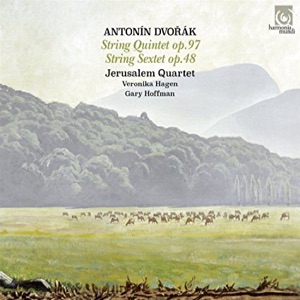This coupling is a popular one, and with good reason. The Sextet marks the beginnings of Dvorák in “Slavonic” mode, with a second movement “Dunka” and a “Furiant” for a scherzo, while the String Quintet comes from his “American” period, with all that this entails as regards melody, harmony, and rhythm. Both works are drop-dead gorgeous, and so beguiling that you’ll never notice the remarkable sophistication and craft that went into their creation.
There have been several excellent releases featuring this music, most notably the Panocha Quartet’s versions on Supraphon, now found in that label’s boxed sets of Dvorák’s complete chamber works. The Jerusalem Quartet and friends doesn’t play with the Panocha’s silky smoothness of timbre, but that’s not a criticism, merely a reflection of a different school of playing and aesthetic sensibility. Their more grainy (but never harsh) sound has its own appeal, especially in the Sextet’s exotic slow movement, its scherzo, and everywhere in those open-air, “hoedown” passages that pepper the Quintet. And in terms of intonation and ensemble balance, these players rank second to none.
Interestingly, both works include sets of variations. In the Sextet it’s the finale, and in the Quintet, the third movement Larghetto. It was Donald Francis Tovey who first pointed out Dvorák’s skill as a writer of variations, calling his movements and larger pieces in the form “perfect.” They are also highlights of these performances, in which the musicians seize with relish every opportunity to display their individual excellence. Their playing offers a very satisfying, wide range of color, combined with the necessary intelligent pacing and attention to long-range coherence. Beautifully engineered to boot, this release stands with the finest. It’s a joy.
































